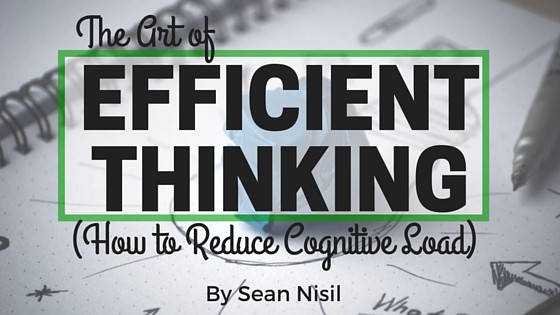Sean Nisil is an entrepreneur and advisor based in California. He is committed to helping people achieve and maintain their ideal lives through his coaching and writing. You can follow him on Twitter @SeanNisil. To receive his most popular articles, join his free newsletter here.
Does your mind feel like it is a tornado of noise, tasks, deadlines, people and projects vying for your attention?
“Don’t forget to use the new cover sheet on the reports at work.”
“Bring home milk on the way home.”
“John’s birthday is coming up soon in a couple weeks.”
If you feel like this, know you’re not alone.
David Allen says, “Your mind is for having ideas, not holding them.”
And he’s right. Let’s dig into this deeper…
Why Cognitive Load Matters
We all have long-term memory and working memory. Our working memory is what we use for learning, decision making, reasoning, and comprehension. But when your working memory is filled with noise, it is not as efficient.
The amount of mental effort being used in the working memory is referred to as cognitive load. This theory is based on John Sweller’s work in cognitive psychology and problem solving. The less you have floating in your mind, the more working memory is freed up to think clearly and solve problems.
Download Your Mind
In order to better leverage your working memory, you need to reduce your cognitive load as much as possible. This will boost your creativity, reduce stress levels and even enhance your problem solving capabilities.
So, how can you do this? Here are three specific approaches that work well for me.
Talk It out
I’ve found one of the best ways to keep a clear mind is to use a dictation service. You just leave a voice recording and then an app turns the recording into text for you and emails it for you.
I use a dictation service every day for both personal and professional needs. After a client meeting, I do a dictation. If I have a business development idea I want to run by my team later in the week, I do a dictation. If I need to remind myself to pick up ice cream for a birthday party, I do a dictation. You get the point.
The typed dictation is sent to my assistant who updates my calendar and assigns me tasks as needed. If you don’t have an assistant, set some time aside at the end of each day to review your dictations and filter the information as needed.
The top two dictation services I’ve found are Copy Talk and Mobile Assistant. I’ve used both extensively, but decided to stick with Mobile Assistant because their smart phone app is fantastic.
If you are working on a lean budget, a free alternative is to use the talk to text feature on your phone and send yourself emails during the day.
Get A Storage Space For Ideas
For anything that is not time sensitive, I have an idea journal. In the past, I used a Moleskine pocket journal, but lately I’ve switched over to keeping digital notes in my iPhone. Ideas often pop up unexpectedly. Instead of holding onto all these ideas, I jot them down as quickly as possible when they come. Once I have download them into my idea journal, I move on.
Most ideas come to me in the morning, while driving, or during exercise. So pay close attention to when your ideas usually come and be sure to have that idea journal handy during those times.
Avoid Straining Your Brain
Try to reduce the amount of decisions you have to make each day. Since you only have a finite amount of mental energy, why waste it on the mundane?
Prepare your outfit the night before. Decide on meals ahead of time. Create systems so you know when you’re running low on mental energy (both personal and business), so you don’t have to make that extra purchase order or trip to the store.
In summary, the big idea is to reduce your mental noise and congestion. By doing so, you will be able to think with both clarity and efficiency.
Do you have any tips or tricks for how you improve your thinking? I’d love to hear about them in the comments.
Also, if you enjoyed this post I’d love to keep in touch with you here. I’ve got an upcoming book called The Productivity Playbook that is coming out in 2016. The book is packed with actionable advice to help you hone your vision, maximize your time, and excel at work.


